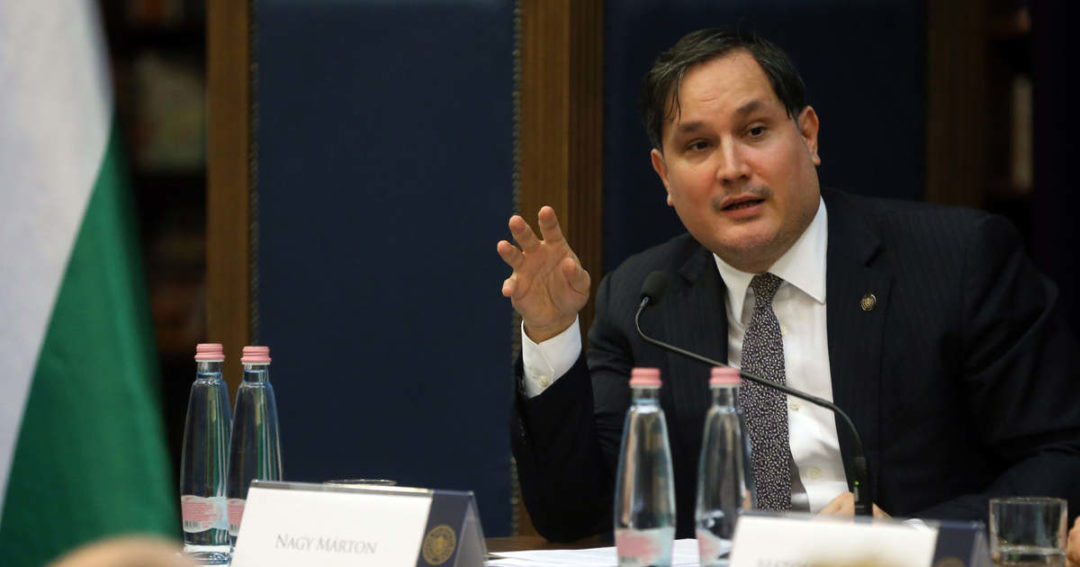Inflation Reduction Act (IRA), i.e. inflation reduction law - this is the name of the American legislation that would make the country's industry great again from January 1, 2023 with significant state support, squaring Trump's economic aspirations, and at the same time grasping the war that plagues Europe, sanctions and energy crisis provided opportunities. Opinion article by Minister of Economic Development Márton Nagy.
The detailed IRA law, which this time strengthens the industry not on the demand side, but mainly on the supply side, through targeted tax incentives, subsidies, and discounted loans, symbolizes the sudden change in economic policy direction. More and more people in Europe interpret the IRA as a declaration of economic war.
In practice, Biden is even more Trumpian than Trump, but he packages his aspirations in a green-progressive way.
Thus, the IRA is not just a law, but an era. After it has been proven that the world economic order previously tailored to the most developed countries by Western elites, together with its framework and organizing principles, no longer serves Western interests, it is Washington who is announcing the end of the Washington Consensus with the economic actors. Only Washington is missing from the Washington Consensus, and with this neoliberalism gives way to wartime Keynesianism, in which the state supports companies not with the passivity of a watchful night watchman, quietly bending the rules, but very actively and spectacularly, and in return, of course, expects corporate compliance in line with political interests. behavior.
It is shocking that two branches of the economic mainstream, the neoliberal and the progressive camp, immediately rush to justify Biden's economic theory: the free flow of knowledge, capital and products is no longer a prerequisite for global, peaceful, common growth, but a sign of weakness in the in a post-global world, the gap in the shield through which hard-to-accumulate knowledge and capital leaks out and turns against us.
This is not a new effort on the American side
Yesterday, the progressives were still worried about the developing world, but today they say that the world needs to consolidate into trade blocs as soon as possible and that protectionism, even a new mercantilism, is needed to protect the working man or the climate. According to proponents of deglobalization, a localized value chain is resilient, sustainable and produces less inequality. All of this is a means of defeating Europe or even China. Instead of globalization, localization is the new direction. The fact that, according to the IMF, the fragmentation of the world could cost up to 7 percent of global GDP is not an issue.
With this, the world may return to the era of Cold War economic blockade.
It proves once again that there are two kinds of economists: those who know history and those who think they have revolutionary new insights. With the latter, the West brings back KGST, raising it to a higher level with the well-known old arguments, slightly repackaged, with the well-sounding terms "friendshoring", "nearshoring", "reshoring", "onshoring" or even "decoupling", in many cases supporting all of this with the climate protection or inequality argument that has become mandatory nowadays. It is interesting that at the end of the last century, the opposite of this, globalization, was expected to equalize prosperity, to catch up, or to manage climate change by encouraging innovations and increasing efficiency. This program was forced on the developing world through the international financial organizations, because even then, according to their point of view, free trade was in the interest of the developing world.
This is not a new effort on the part of the Americans: the intention to "suppress" Europe in foreign trade and finally achieve a permanent foreign trade surplus with the old continent goes back decades. Germany's foreign trade surplus with the USA jumped from less than 10 billion euros to 86 billion dollars in the last thirty years, almost half of which is accounted for by trade in motor vehicles. To turn the situation around, after Trump's tariffs, Biden is deploying state subsidies: $7,500 in subsidies to consumers if they buy a "made in the US" electric car, and to European car and battery manufacturers, the US provides a fourfold subsidy if they relocate.
The worst possible scenario for the Hungarian economy is when America brings tanks and takes industry.
The old goal now seems feasible for the United States, since Europe, forced into the failed economic and sanctions war against Russia, has long been in such a weakened, vulnerable and uncertain state that even companies do not want to endure it for a long time. In such an environment, the American offer flashes the economic Garden of Eden for European companies: energy (gas or electricity) is still available for five bucks, more (free) money, stability and security - the sunny side of war.
From its own strength, Europe can sustainably guarantee little of this in the long term, and even if it is able to do so, it is understandably difficult for it to believe in the current chaotic situation, since it was already affected by the war as a sick man, and seems to be completely behind in terms of competitiveness. It gives a smaller and smaller slice of the global economic performance, fewer and fewer European companies are included in the world's hundred largest companies, and European cities and regions are slowly running out of the top lists of global financial or economic power centers. The energy crisis, the resulting European deindustrialization and the American-European trade war are therefore not separate but interconnected challenges.
We become a geopolitical and economic bridge
So we are at the point where it has been proven: economic sanctions give birth to a new economic war, this time also between allies. The economic war will actually be a subsidy competition, a "race-to-the-top" phenomenon. This is nothing new, the economic war is also won by the one with the greatest financial firepower. So far, for example, Germany and France have distributed 80 percent of the subsidies that can be given to their companies as a result of the temporary EU crisis framework (TCF) due to the Ukrainian-Russian conflict and the energy crisis, according to Politico's calculation, so these two countries have begun with the greatest enthusiasm to dismantle the previous EU market competition rules.
This year, for example, according to the Bloomberg analyst consensus, the budget balance in Germany may reach 4.5 percent of GDP (a deficit not seen since 1995), after last year's 2.5 percent. It is no coincidence that Germany uses tricks to banish extra expenses from its budget. The IRA can significantly amplify this process, even more support, growing budget deficit at the state or EU level (setting up a new common fund). So the goal has changed, we have to defend not only against the energy crisis, but also against the USA.
Our advantage may be that we were ten years ahead of most of the world with the reindustrialization program, the results of which we are already seeing.
While several developing countries are afraid of premature deindustrialisation and getting stuck in the middle development trap, in our country the Western and Eastern car manufacturing are just now forming an alliance (who brings the capital and who brings the know-how is no longer quite clear, as China is already the global leader in electric cars). According to forecasts, Hungary will be the fourth largest factor in battery production worldwide by 2027 after China, America and Germany.
We become a geopolitical and economic bridge, and because the bridge connects, many people will want to step on it. We have to connect the blocks, and we hope that by involving international value chains, we can also build the bridge to the future. This is how we can maintain our investment-led (our rate is 27 percent, among European record holders) and export-led (85 percent, globally outstanding) growth model, helping to deepen the complexity of the Hungarian economy, because based on international experience, this may be the safest and least risky catch-up road.
In the medium term, the weight of the Hungarian vehicle industry (including battery production) could reach 30 percent of GDP from the current nearly 20 percent, which would position the country as a relative industrial superpower, a regional industrial middle power. Global economic warfare also threatens this, as the central element of the subsidy competition is electric car production.
We also have no choice but to be among the first to enter the support competition, multiplying the value of the funds by making them reach the companies easily and well-targeted ahead of others. At the same time, we not only have a step advantage, but also a disadvantage, since we have to implement the twin transformation at the same time, putting the operations of companies on a new basis with energy efficiency and digital transformation, and Hungary is known to have debt in both.
In the reindustrialization war, we can protect ourselves with two main groups of tools, in addition to dozens of known tools of industrial policy, for which we must provide as many resources as possible. One of them is the EKD provided by HIPA, which is a non-refundable grant given by a unique decision, which is typically given to companies that are committed to our country, bring knowledge, and produce high added value for the implementation of their investments.
The other main tool is the provision of reimbursable funds, capital, and interest-subsidized loans - in our case through MFB, Eximbank and the Széchenyi Card Program. With the more active use of these assets (increasing size and faster deployment), the designation of key sectors and their regional development, the investment- and export-driven Hungarian economic catch-up, which builds energy efficiency from loans, can continue. When awarding grants, however, we no longer have to pay attention to additionality (i.e., whether an investment would be realized or not be realized even without support), in the case of a grant competition, the question will be whether the investment will be realized in our country or in another country.
We must therefore prepare for the fact that the protectionist world economic order is reorganizing the two important pillars of our growth, international investments and international trade, exports. Therefore, we also have to completely transform the support policies that encourage them (including the budget resources available for investment support, the implementation of the investment, the related infrastructure developments, labor and energy demand, etc.), also trusting that the global economic turmoil will favor tooth, for investment in our region.
The author is an economist, the minister responsible for economic development in the fifth Orbán government
Featured image: MN












